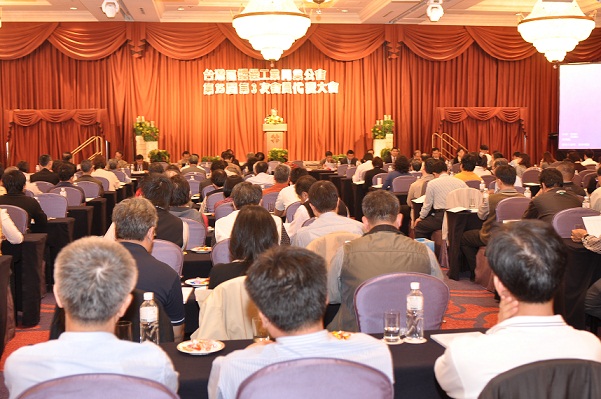


by Kelly Wang, Fastener World Inc.
On December 24. 2010, which was the Christmas Eve and the day before the Constitution Memorial Day, the 15th Annual, Third Meeting of TIFI (Taiwan Industrial Fasteners Institute) was held at Grand Hi-lai Hotel of Kaohsiung. Two speeches (“the opportunities posed for the fastener industry of Taiwan in the global competition” and “the cultivation of talents for the fastener industry”) were given in the meeting. Under the guidance of the host, Mr. Joe Chen (the Chairman of the TIFI), the meeting was quite successful and we could see the bright future of the fastener industry of Taiwan through the grasp of the opportunities and the cultivation of talents.
Shortly after the meeting was started, Mr. Joe Chen, the Chairman of the TIFI, pointed out that the amount of the fastener products exported from this country in 2010 is expected to exceed 1.27 million tons, and the monetary value is expected to exceed US$3.1 billion. The average unit price is about US$2.48/Kg, an increase of 6.6% as compared with the same period in 2009. These figures show that the levels before the global financial storm in 2008 have been resumed. In addition, these figures show that the fastener products made in Taiwan have been upgraded and have differentiated themselves from those made in China. Though Taiwan ranks the 5th in the world in terms of production output, Taiwan ranks the second in the world in terms of export amount. The US comprises 39.2% of the export market of Taiwan in 2010 (a slide from 50% in the past). This fully reflects the effort made by the fastener industry of Taiwan in terms of market diversification. Mr. Luo, the principal of National Kangshan Agricultural & Industrial Vocational Senior High School, indicates that the academia and the industry should have a high regard for practical usefulness and that the teachers should fully understand what the industry needs and cultivate talents according to the needs. Mr. Chen points out that the CE mark of the EU is a new requirement, and it takes the joint effort of the industry, the government and the academia to reach it. Regarding the recent sunset review of stainless steel fasteners, the fastener industry of Taiwan should figure out a solution to the problem.
Mr. J. C. Tsou (the Chairman of China Steel Corp. in Taiwan), who was one of the dignitary guests of the meeting, indicates that, regarding the competition posed by China, the fastener industry of Taiwan must ask itself: What are our competitive advantages to enable us to win? The solution lies in the union of talents and technology, the development of R&D and a complete set of measures to cope with the issue. Mr. Qi-Chuan Huang, who is the Chairman of MIRDC (Metal Industries Research & Development Center), points out that the fastener industry has become an important industry of Taiwan and has made a lot of contribution to the economic development of Taiwan. MIRDC has been established for 47 years and has assisted the upgrading of many industries since 2007. As of now, there are about 280 R&D staff and 1,096 companies have been assisted by the MIRDC. In addition, 274 R&D cases have received a grant from the government, and over 3,000 professors have given their assistance to the relevant industries. In the future, MIRDC will continue to assist the upgrading of the fastener industry of Taiwan and complete the upgrading. Mr. Jeng, the director of Chinese National Federation of Industries, said that the TIFI was a member of the CNFI and the CNFI submitted a document containing suggestions to the industrial development to Jin-Tao Hu, the Chairman of the central Chinese government, to facilitate the industrial development of Taiwan in the future. In the future, CNFI will continue to be a liaison between the government and its members.
In the meeting, Dr. Dong-Yih Lin, a professor of Department of Chemical and Materials Engineering and the Chief of Fastener and Steel Research Center, National University of Kaohsiung, was invited to the meeting to give a speech on “the opportunities posed for the fastener industry of Taiwan in the global competition”. Dr. Lin used to work for China Steel Corp. for four years and just came back from South East Asia Iron & Steel Institute after he gave a speech in a meeting of the SEAISI. He points out that the countries of southeastern Asia, such as Thailand, Malaysia, Indonesia, and the Philippines are undergoing big changes and that, in particular, the gap between Taiwan and Vietnam is getting smaller. Therefore, we here in Taiwan should not underestimate the potential of these countries. According to the SWOT analysis, because of the presence of more and more competitors and the fact that many companies and manufacturers have moved out of Taiwan, the industries of Taiwan have to make more effort in the marketing channels. He specially points out that kitchenware is an area that cannot be ignored because one fourth of them are fitted with fasteners, and more and more families can afford them. Therefore, this area poses a great opportunity for the fastener industry. He also adds: with the rise of China and the vicious price-slashing war, the advantages of the fastener industry of Taiwan include talents, capital and technologies, and the opportunities lie in our next generation. As of now, Fastener and Steel Research Center is equipped with instruments such as SEM, which has a price tag of NT$10 million, and has been actively developing new high-strength materials. He uses stress curves to explain the development and applications of new types of steel, such as IF, Mild, BH. CMn, HSLA, TRIP, DP, and CP. He emphasizes that any change in the material would bring about a revolution.
The Center has successfully developed a type of antiseptic steel, which has the antiseptic rate of 99.99%. The antiseptic steel has been patented and may be used for elevators, kitchenware, restroom products, and cargo trucks. He also uses the metallic alloy tester (Gleeble 3500) as an example to explain the importance of “simulation of optimal process parameters of hot working of metallic materials”. Taiwan must develop the technologies to widen the gap between Taiwan and other countries. Regarding the future trends, fasteners will be closely related to our life; the fasteners used for automobiles will continue to exhibit big growth in 10 years; fasteners used for solar energy devices, and wind power generation will have a bright future. Fasteners used in constructions will be developed in the direction of 30% energy saving production methods. The core competitiveness lies in the types of steel with higher quality and higher unit price, such as the ones used for automobiles, electronic products, and aerospace industry. If these products can combine with the relevant products, their growth will be unlimited. Last, he points out that Japan, the US and Europe are located at a latitude that is different from that of Taiwan and, therefore, the relevant standards should not be set by these countries for Taiwan. Taiwan should set its own standards.
The cultivation of talents is quite important, and the organizations that provide such cultivation are the navigator. Mr. Gow-Yi Tzou, the provost of Kao Yuan University and the Chief of Research Center of Fasteners Industry Technology points out that if the fastener industry is to get better, the corporations must be willing to cultivate their employees. In Kao Yuan University, humanities and technology are equally weighed and learning is combined with the industries. The aims are to meet the needs of the industries and to reach 100% employment for its students. The focus is on the research and development of fasteners. As of now, the production value has reached NT$100 million, and 108 patents have been acquired. In addition, there are many sessions provided in Kao Yuan University and these sessions cover the subjects or areas, such as metal formation, the design and analysis of dies, materials and fabrication, the management of science and technologies, energy saving of manufacturing processes and green fabrication, surface engineering, heat processing of metals, non-intrusive tests, etc. Therefore, Kao Yuan University is the best place for the cultivation of talents. If the fastener industry is to be upgraded, the cultivation of talents would be a must, and we have to be careful in the selection of an organization that provides training and cultivation.












